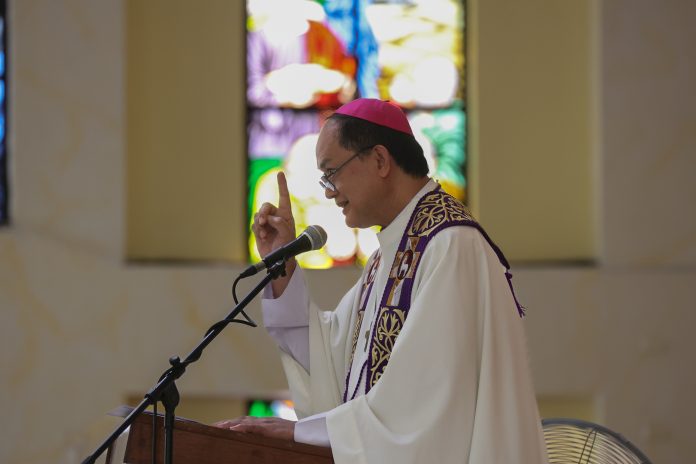Bishop Pablo Virgilio David of Kalookan on Friday clarified that “it is not exactly” the Catholic Bishops’ Conference of the Philippines (CBCP) that is engaging with the government’s anti-communist task force.
Bishop David, who heads the CBCP, said it is the Episcopal Commission of Public Affairs “that is there as a private sector representative”.
The prelate made the clarificatory statement after the National Task Force to End Local Communist Armed Conflict (NTF-ELCAC) announced that the CBCP has “accepted warmly” its invitation to become one of its members.
On August 31, Usec. Ernesto Torres, executive director of NTF-ELCAC, said the task force’s executive committee agreed to have a member from the religious sector as one of the private sector representatives.
“So with them on our side it will be a lot easier to disseminate, to cascade the information, the good news of the government to those living in the far-flung areas considering the trust and confidence and respect that the general populace has for those in the religious sector. It would readily be accepted by them,” he said.
The CBCP Episcopal Commission of Public Affairs is headed by Bishop Reynaldo Evangelista of Imus and Fr. Jerome Secillano as executive secretary.
The Commission has gained access to the NTF-ELCAC ExeCom, which Bishop David said gives “more opportunity to express the Church’s specific concerns… to advance some of the social concerns and issues of the Church”.
“The said Commission also has the intention of providing moral-ethical approaches to dealing with the problem of insurgency,” said the prelate.
However, the prelate expressed that the CBCP Permanent Council will tackle if the Commission could engage NTF-ELCAC “without having to join its ExeCom as a member”.
In an interview with Rappler’s Inday Espina-Varona, Fr. Secillano said, “Membership in [NTF]-ELCAC doesn’t mean being co-opted by the government.”
The priest said the presence of the Commission in the anti-communist task force “means having the proper forum and mandate to articulate church concerns and issues affecting the people”.
He also said that the focus is “not the militarization of the problem” but on extending basic social services to the poor and vulnerable.
Fr. Raymond Ambray of Tandag, however, warned that collaborating with NTF-ELCAC is “dangerous,” especially if the church leaders “do not have a clear grasp of the problem”.
The priest said by joining NTF-ELCAC, the church leaders have taken one side – “the side of the perpetrator”.
“They are adding and doing more violence to the hapless victims of the conflict. Needless to say, many church workers, including priests and nuns, are at the forefront of serving the poor. They are victimized too by NTC-ELCAC’s witch-hunting,” he said.
Fr. Ambray urged the clergy “not to veer from the mandate of the Gospel – to renounce evil including its structure”.









